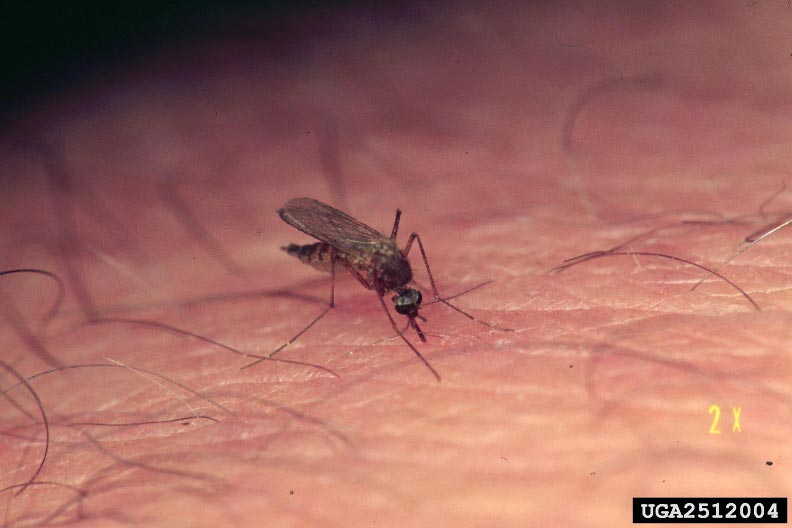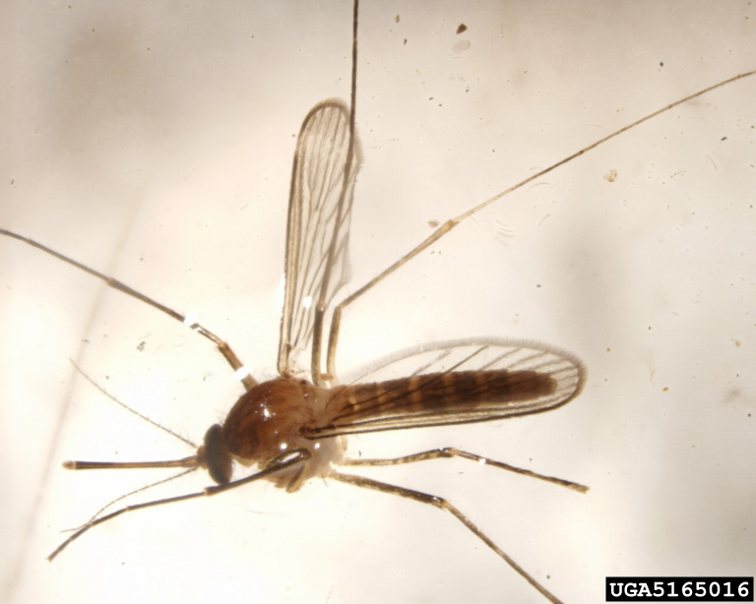 Outbreaks of West Nile Virus reported in Texas and Florida over the past few weeks have caused a lot of concern and the CDC just reported the deaths of 43 here in the United States. Sadly, South Jersey reported it’s first death – an elderly man from Willingboro, New Jersey.
Outbreaks of West Nile Virus reported in Texas and Florida over the past few weeks have caused a lot of concern and the CDC just reported the deaths of 43 here in the United States. Sadly, South Jersey reported it’s first death – an elderly man from Willingboro, New Jersey.
Image courtesy of Jim Occi, BugPics, Bugwood.org
Mosquitoes are capable of transmitting numerous diseases to humans. Diseases such as encephalitis – locally, Eastern Equine Encephalitis and St. Louis encephalitis, malaria, and West Nile Virus.
What is West Nile Virus?
West Nile Virus was first identified in 1937 in Uganda in eastern Africa. It was first discovered in the United States in the summer of 1999 in New York. Since then, the virus has spread throughout the United States.
The West Nile Virus is a type of virus known as a flavivirus. Researchers believe West Nile virus is spread when a mosquito bites an infected bird and then bites a person.
Mosquitoes carry the highest amounts of virus in the early fall, which is why the rate of the disease increases in late August to early September. The risk of disease decreases as the weather becomes colder and mosquitoes die off – usually with the first or second frost.
Although many people are bitten by mosquitoes that carry West Nile virus, most do not know they’ve been exposed. Few people (1 in 150) develop severe disease or even notice any symptoms at all.
Mild disease, generally called West Nile fever, may cause some or all of the following symptoms:
- Abdominal pain
- Diarrhea
- Fever
- Headache
- Lack of appetite
- Muscle Aches
- Nausea
- Rash
- Sore throat
- Swollen lymph nodes
- Vomiting
These symptoms usually last for 3 – 6 days.
Risk factors for developing a more severe form of West Nile virus include:
- Conditions that weaken the immune system, such as HIV, organ transplants, and recent chemotherapy
- Older or very young age
- Pregnancy
- West Nile virus may also be spread through blood transfusions and organ transplants
- It is possible for an infected mother to spread the virus to her child through breast milk
More severe forms of disease, which can be life threatening, may be called West Nile encephalitis or West Nile meningitis, depending on what part of the body is affected. The following symptoms can occur, and need immediate attention by a health care professional:
- Confusion or change in ability to think clearly
- Headache, High Fever
- Loss of consciousness or coma
- Tremors (shaking)
- Convulsions
- Muscle weakness
- Stiff Neck
- Weakness of one arm or leg
For patients with severe cases of West Nile virus infection, the outlook is more uncertain. West Nile encephalitis or meningitis may lead to brain damage, permanent muscle weakness and death. Approximately 10% of patients with brain inflammation do not survive.
There is no specific treatment for the West Nile virus infection and there is no vaccine.
 The best way to prevent West Nile virus infection is to avoid mosquito bites.
The best way to prevent West Nile virus infection is to avoid mosquito bites.
- Use EPA Registered mosquito-repellant products containing DEET
- Wear long sleeves and pants when outdoors
- Tip, Toss and Turn regularly – drain pools of standing water, such as trash bins and plant saucers (mosquitoes breed in stagnant water)
Image courtesy of Charles Olsen, USDA APHIS PPQ, Bugwood.org
If your efforts to keep Mosquitoes at bay are not working – we can help to minimize the problem as quickly as possible – Call AB-Con today and have your Mosquito problem solved safely from the start!
